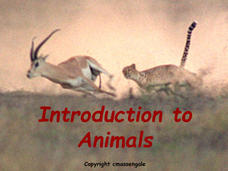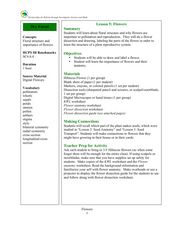Curated OER
What is an animal?
In this animal worksheet, students determine which characteristic of an animal matches the given statement. Students describe illustrations of animals using the terms radial symmetry, bilateral symmetry, and no symmetry.
Columbus City Schools
Get Your Organisms Organized
From large to small, show your class how to organize them all! Included within the guide is everything you need to take their knowledge of classification from the cellular to the species level. The worksheets focus on...
Curated OER
Science and Math Lab (Students Look at Symmetry in Nature)
Students study patterns. In this symmetry in nature lesson, students examine objects to determine what type of symmetry they have. They work in small groups to rotate through stations that have objects for them to study.
Curated OER
A Side View
In this animal symmetry worksheet, students label organisms by the type of body symmetry that organism has. Then students draw an example of each type of symmetry. This worksheet has 3 drawings and 21 fill in the blank questions.
Curated OER
The Phylogenetic Tree
In this biology worksheet, students label parts of a phylogenetic tree and differentiate between bilateral symmetry and radial symmetry.
Curated OER
Invertebrate Phyla
Young scholars explore the invertebrate phyla. They discuss the characteristics of the invertebrate Phyla in the Kingdom Animal. Students classify organisms into Phyla based on their characteristics. They distinguish radial symmetry,...
Curated OER
Invertebrates
Middle schoolers examine invertebrates. In this animal classification lesson, students discuss invertebrates and bilateral symmetry. They discuss the importance of horse shoe crabs in medical science.
Curated OER
Gardens Under the Sea: Coral Reefs
Students, with dive partners, explore coral reefs through scuba diving. They also explore radial symmetry and bilateral symmetry.
Curated OER
Body Plans and Adaptations
In this body plans and adaptations worksheet, students will review the different types of symmetry found in organisms. Students will identify body parts as found on either the ventral or dorsal part of an animal. Then students will look...
Biology Junction
Introduction to Animals
Out of all animals, elephants alone lack the ability to jump. Scholars learn all about animals using a presentation full of fun examples. It describes different types of animals, the biological similarities and differences between...
Curated OER
Tackling Taxonomy
Students study physical characteristics of separate phyla and place them into similar groups. This lesson is part of a multi-segmented unit on the diversity of life. students develop a classification system by grouping animals into...
Curated OER
What is an Animal?
In this animal worksheet, students review various characteristics that are associated with animals including body plan and skeletal structure. This worksheet has 11 fill in the blank questions.
Curated OER
Comparing and Contrasting
Learners practice compare and contrast skills. In this science and language development instructional activity, students complete a T chart generating traits of a snail and a clam. Learners complete a related worksheet.
Busch Gardens
Create an Invertebrate
What better way for young biologists to learn about invertebrates than by creating their very own? Here, students are assigned a set of invertebrate characteristics and are asked to invent an imaginary ocean animal...
Curated OER
Animal Characteristics
Allow your students to review what they learned about animal characteristics with this PowerPoint. This slideshow includes 9 multiple choice questions and an answer key at the end. Tip: You can use this as an assessment by having your...
Curated OER
Invertebrates
In this invertebrate worksheet, students review characteristics of the different types of invertebrates. This worksheet places 32 vocabulary words into a crossword puzzle.
Curated OER
Fall 2003 Midterm Exam #3
Let there be light! When your physics learners take this midterm exam, light will be their focus. They will show what they know about electromagnetic waves, interference, refraction, reflection, lenses, prisms, and more! The test is...
Curated OER
Using a Dichotomous Key for Invertebrate Phyla
Students use a key to determine the phyla of invertebrates. They are broken into groups and each group gets a stack of pictures and uses the key to determine which phyla the animal belongs to. There are also individual questions for...
Curated OER
Classification of an Echinoderm
Students study starfish through dissection. In this biology lesson plan, students explore the lives of starfish as they view a slide show, observe parts of echinoderms, and compare the classification of the starfish with other...
Curated OER
Introduction to Animals Concept Map
In this animal science worksheet, students complete a concept map on the features of animals. They fill in 12 blanks with the correct words from the list.
Curated OER
Dry Forest: Flowers
Students explore botany by examining diagrams. In this plant reproduction lesson, students define a list of plant vocabulary terms and identify plant anatomy from a diagram. Students complete several plant activity worksheets and study...
Curated OER
Classification of Intertidal Organisma
Students categorize animals. In this animal classification lesson, students group animals by their characteristics. Students break into groups and work together to classify the animals. Students fill out a graphic organizer with their...
Other
San Francisco State University: Animal Body Plans
College-level instructor's notes on how animal body plans have changed over time through the process of evolution.
























